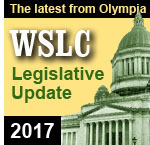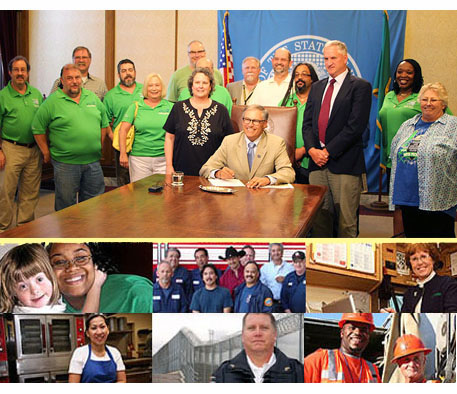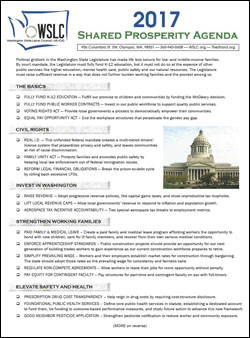STATE GOVERNMENT
The consequences of our state’s low pay (Legislative Update)
Below-market government wages have created recruitment, retention crisis
 OLYMPIA (Jan. 17, 2017) — By its own admission, the biggest employer in Washington state pays workers less than what they’d earn at 99 percent of its competitor companies—99 percent! Justifiably concerned about keeping and attracting quality employees, the CEO agreed to 6 percent cost-of-living raises spread over the next two years. The idea is, after years of asking employees to take pay cuts or forego raises during an economic downturn, it’s time to start catching up so they can remain competitive. But this is a publicly owned company, and some members of its Board of Directors don’t seem to like the idea. The economy may have improved, but some suggest that they have other more important priorities than raises.
OLYMPIA (Jan. 17, 2017) — By its own admission, the biggest employer in Washington state pays workers less than what they’d earn at 99 percent of its competitor companies—99 percent! Justifiably concerned about keeping and attracting quality employees, the CEO agreed to 6 percent cost-of-living raises spread over the next two years. The idea is, after years of asking employees to take pay cuts or forego raises during an economic downturn, it’s time to start catching up so they can remain competitive. But this is a publicly owned company, and some members of its Board of Directors don’t seem to like the idea. The economy may have improved, but some suggest that they have other more important priorities than raises.
 That’s basically the situation with the State of Washington, its more than 110,000 employees (FTEs), Governor Jay Inslee, and the State Legislature. And ironically, its the legislators who suggest government “should be run more like a business” who appear most reluctant to pay their employees market wages.
That’s basically the situation with the State of Washington, its more than 110,000 employees (FTEs), Governor Jay Inslee, and the State Legislature. And ironically, its the legislators who suggest government “should be run more like a business” who appear most reluctant to pay their employees market wages.
At hearings in the first week of the 2017 legislative session, state employees urged lawmakers not to ignore their responsibilities to the people who make state government work.
 “We hope you understand that a consequence of ignoring the rising price of doing business in state government (is) we are facing recruitment and retention problems at unprecedented levels in many vital areas of state service,” Brooks Salazar, an 8-year employee at the Board of Industrial Insurance Appeals in Seattle, told the Senate Ways and Means Committee.
“We hope you understand that a consequence of ignoring the rising price of doing business in state government (is) we are facing recruitment and retention problems at unprecedented levels in many vital areas of state service,” Brooks Salazar, an 8-year employee at the Board of Industrial Insurance Appeals in Seattle, told the Senate Ways and Means Committee.
The state’s own salary survey found that 99 percent of state job classifications are below market rates. Some 66 percent of state jobs are more than 25 percent behind, and 23 percent are more than 50 percent behind market rates.
Gov. Jay Inslee’s budget proposal funds the collective bargaining agreements negotiated last fall. That means modest, but important cost-of-living increases for the people who keep our communities safe, care for the elderly and disabled, protect our children, maintain our roads and transportation system, instruct and serve students at state universities and colleges, and provide other essential services. This is important because we need to retain experienced state employees and recruit quality new ones if we want these critical services to be efficient and effective.
We hold our state’s employees to high standards of professionalism and accountability, and we already depend on their dedication to public service keeping them from seeking more lucrative opportunities elsewhere. We can’t afford to let their compensation fall even further behind. That would be bad for them and their families, bad for the citizens of Washington state—and in the vernacular of those who like to compare public service to private enterprise—it would be bad for business.
We must be All In for Washington to fund schools
With schools closed for Martin Luther King, Jr. Day on Monday, thousands of students, teachers, parents and community supporters rallied at the State Capitol to urge state lawmakers to amply fund K-12 basic education as required by state law, the Supreme Court’s McCleary decision, and the state constitution. The timely message of this rally organized by the Washington Education Association, NAACP and the Washington Paramount Duty coalition is that a quality education is a civil right.
As described in last week’s edition of this newsletter, legislators who say “fund schools first” but oppose raising the revenue necessary to do so are essentially saying they want to fix the school funding problem by cutting other services, laying off more public employees, and freezing/cutting the pay of those who remain.
It is much more fair and responsible to close outdated and wasteful tax loopholes or lightly tax those most able to pay, as in the governor’s proposal, rather than cut one set of essential services to pay for another. We can afford great schools and protect other state services, but only if we clean up our tax code. That means we need to begin telling our elected representatives and senators to clean up our tax code by eliminating wasteful tax breaks, making polluters pay, and closing the tax break on the sale of stocks and bonds that only benefits the wealthiest households.
A new group called All In for Washington makes that easy. Visit AllInForWA.org for more information and to send an email to your legislators urging them to clean up our tax code.
 WSLC’s Shared Prosperity Agenda
WSLC’s Shared Prosperity Agenda
This newsletter is intended to highlight the case for and the status of legislation of concern to the Washington State Labor Council, AFL-CIO. See the WSLC’s 2017 Shared Prosperity Agenda for an outline of many of those issues.
Don’t forget to sign up for the WSLC Legislative Reception and Lobbying Conference in Olympia on Feb. 2-3. Register online or get more here.
Also, there’s much more news from the State Legislature posted each week at The Stand. This past week, it included:
Boeing cashes in on tax breaks, cuts 11K jobs in Washington — The Boeing Co. has eliminated the jobs of more than 11,000 Washington state residents since Gov. Jay Inslee and the Legislature agreed to give the company the largest corporate tax incentives in U.S. history. That’s why Machinists Union District Lodge 751 and the Society of Professional Engineering Employees in Aerospace are continuing to push for legislation that would hold Boeing accountable for the way it’s spending its share of the $8.7 billion aerospace tax incentives package that Washington Gov. Jay Inslee signed into law in November 2013.
Renewed push begins in Olympia for paid family leave — The Washington Work and Family Coalition on Tuesday announced its policy proposal for paid family and medical leave in Washington. Under the proposed bills, Washington workers would be able to use extended paid leave for events like the birth of a child, a personal health emergency, or to take care of an ill family member, like an aging parent. A recent poll showed at least 72 percent of Washington voters supported passing paid family and medical leave, and the Work and Family Coalition is looking to the Legislature to act.





